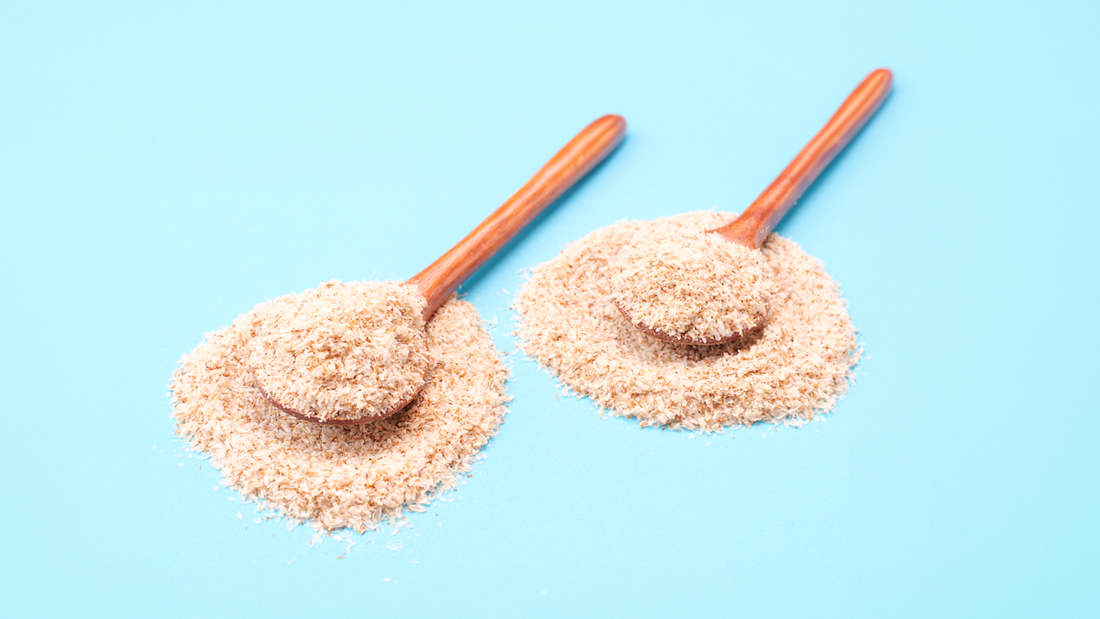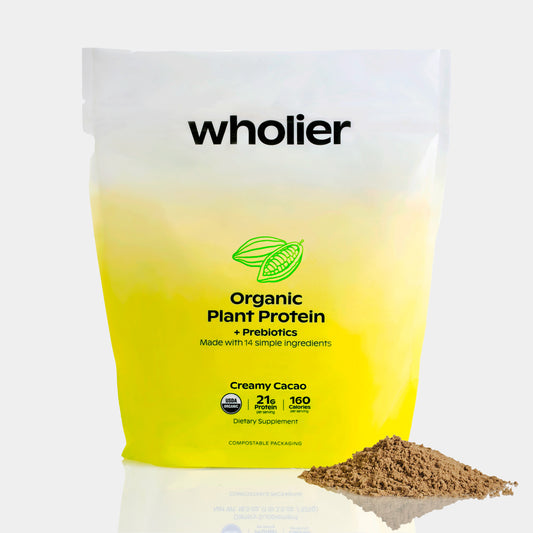
Unlocking the Full Potential of Psyllium Husk: A Complete Guide
Known for its impressive dietary fiber content, psyllium husk is derived from the seeds of the Plantago ovata plant, a shrub native to India.(1) It's available in different forms, including powder, capsules, and even as a primary ingredient in certain cereals. Its versatility makes it a valuable addition to various recipes and supplements.
What Are the Health Benefits of Psyllium Husk?
When it comes to psyllium husk, the list of potential benefits runs deep. Here are the standout health advantages that have captured the attention of nutritionists and health enthusiasts alike:
- Digestive Health: It's well documented that psyllium husk helps maintain regular bowel movements and can alleviate symptoms of constipation. This is due to the high fiber content that absorbs water in your gut, softening your stools and promoting overall digestive health.(2)
- Blood Sugar Management: Research has found that psyllium husk can help control blood sugar levels in people with type 2 diabetes. The soluble fiber in psyllium slows down the digestion and absorption of food, thereby assisting in maintaining healthy blood sugar levels.(3)
- Weight Management: By promoting a feeling of fullness, psyllium husk can aid in weight management. It’s low in calories but high in soluble fiber, which can help curb excessive eating by reducing hunger pangs.(5)
- Heart Health: Psyllium husk doesn’t stop at aiding digestion and weight management. Studies show that it can contribute to heart health by lowering cholesterol levels. It does this by binding to dietary fats and cholesterol in the gut, helping to remove them from the body.(4)
- Prebiotic Benefits: Emerging research suggests that psyllium husk may act as a prebiotic, feeding the beneficial bacteria in the gut. This can improve gut health and further contribute to overall wellbeing.(6)
With these health perks, it's clear why psyllium husk is creating a buzz in the health and wellness community.
How Much Psyllium Husk Should I Incorporate Into My Diet?
When it comes to psyllium husk consumption, a tailored approach is often best. The ideal dosage can vary depending on what health benefits you're aiming for. For general digestive health, a typical dosage is around 5 grams, taken three times per day.(7) However, if you're focusing on blood sugar or cholesterol control, you might need to consume slightly more, with recommendations generally falling between 10-20 grams per day, divided into several doses.(8)
Start by introducing a smaller dose to your routine and gradually increase if necessary. This gives your body the chance to adjust to the increased fiber intake.
How Can You Use Psyllium Husk?
The beauty of psyllium husk lies not just in its health benefits, but also in its versatility. Let's explore ten innovative ways you can make psyllium husk a delicious part of your diet:
- Smoothies: Blend psyllium husk with your favorite fruits, a scoop of wholier Organic Plant Protein with Plant-Based Prebiotics (made with psyllium husk), and a dash of almond milk for a filling smoothie.
- Fortified Oatmeal or Yogurt: Boost your morning oats or yogurt with a sprinkle of psyllium husk. A fiber-rich start to the day!
- Gluten-Free Baking: Use psyllium husk as a binding agent in your gluten-free or low-carb recipes. It's a game-changer for baking bread, muffins, or even cookies.
- Homemade Granola: Mix psyllium husk with oats, nuts, seeds, and your preferred sweetener, then bake until golden brown. Perfect with milk or yogurt!
- Nutritious Soups and Stews: Stir psyllium into your soups or stews. It thickens the broth and adds a fiber punch.
- Pancakes and Waffles: Add it to your pancake or waffle batter. It’ll provide extra fiber without altering the taste.
- Healthy Pizza Crust: Try adding psyllium husk to your pizza crust recipe. It can help create a healthier version without compromising on texture.
- Fiber-Rich Juice: Mix a teaspoon of psyllium husk with a glass of fresh juice. An easy way to add fiber to your diet.
- Homemade Veggie Burgers: Psyllium husk can act as a binder in your homemade veggie burger recipe, helping patties hold their shape while grilling.
- Simple Water Solution: If you prefer it straight, just mix psyllium husk into a glass of water. Remember to drink it quickly before it thickens and follow up with another glass of water.
Integrating psyllium husk into your diet can be as simple or as creative as you like. The key is to start slow, pay attention to how your body reacts, and adjust your intake as necessary. And always remember, hydration is crucial when upping your fiber intake with psyllium husk.
Sources:
(1) Dharmananda, S. (2003). Plantago: The Common Psyllium Seed. Institute for Traditional Medicine.
(2) Marlett, J.A., Kajs, T.M., Fischer, M.H. "An Unfermented Gel Component of Psyllium Seed Husk Promotes Laxation as a Lubricant in Humans." American Journal of Clinical Nutrition 72, no. 4 (2000): 784-789.
(3) Gibb, R.D., McRorie, J.W. Jr, Russell, D.A., Hasselblad, V., D'Alessio, D.A. "Psyllium Fiber Improves Glycemic Control Proportional to Loss of Glycemic Control: A Meta-Analysis of Data in Euglycemic Subjects, Patients at Risk of Type 2 Diabetes Mellitus, and Patients Being Treated for Type 2 Diabetes Mellitus." American Journal of Clinical Nutrition 102, no. 6 (2015): 1604–1614.
(4) Anderson, J.W., Allgood, L.D., Turner, J., Oeltgen, P.R., Daggy, B.P. "Effects of Psyllium on Glucose and Serum Lipid Responses in Men with Type 2 Diabetes and Hypercholesterolemia." American Journal of Clinical Nutrition 70, no. 4 (1999): 466–473.
(5) Pal, S., Khossousi, A., Binns, C., Dhaliwal, S., Radavelli-Bagatini, S. "The Effect of a Fibre Supplement Compared to a Healthy Diet on Body Composition, Lipids, Glucose, Insulin and Other Metabolic Syndrome Risk Factors in Overweight and Obese Individuals." British Journal of Nutrition 105, no. 1 (2011): 90–100.
(6) Lambeau, K.V., McRorie, J.W. Jr. "Fiber Supplements and Clinically Proven Health Benefits: How to Recognize and Recommend an Effective Fiber Therapy." Journal of the American Association of Nurse Practitioners 29, no. 4 (2017): 216–223.
(7) Singh, B. "Psyllium as Therapeutic and Drug Delivery Agent." International Journal of Pharmaceutics 334, no. 1-2 (2007): 1–14.
(8) Cui, X., Dai, Q., Tseng, M., Shu, X.O., Gao, Y.T., Zheng, W. "Dietary Patterns and Breast Cancer Risk in the Shanghai Breast Cancer Study." Cancer Epidemiology, Biomarkers & Prevention 14, no. 7 (2005): 1443–1448.




